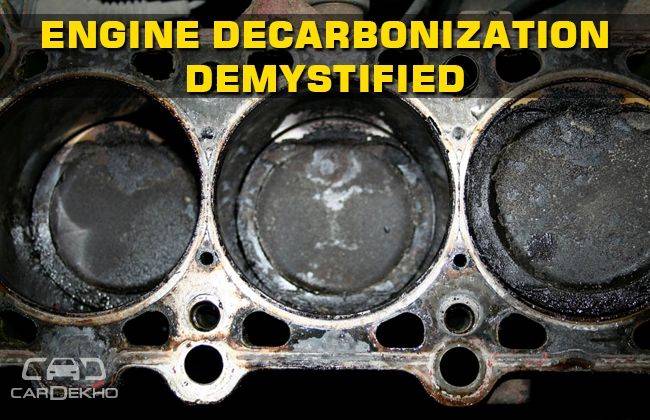Engine decarbonization demystified
<തിയതി> <ഉടമയുടെപേര്> പ്രകാരം പരിഷ്ക്കരിച്ചു
- ഒരു അഭിപ്രായം എഴുതുക
We all want our cars to be in a healthy state, just the way we want our bodies to be fit and fine. I don’t think it will be wrong to say that on most occasions we care more about the overall health of our machines, than we do about our bodies. Just like the plethora of diets and cosmetic surgeries around that claim to give you better health, there are various procedures that claim the same for your car as well. While some like the GM diet are debatable for human beings, for our cars procedures like engine decarbonization and engine flush have also been debated.

Often one notices a drop in the fuel economy or the power of the car – this definitely sends us into a frenzy as power and fuel efficiency drops are not acceptable to any owner. That’s when engine decarbonization creeps into our minds. Engine decarbonization as the name suggests can be a chemical or mechanical process where carbon deposits on the cylinder head, and on the pistons are removed to ensure better functioning of the engine. It also involves getting rid of the carbon deposits from the other working components of the engine.
There are two techniques of decarbonization – mechanical and chemical:
1. Mechanical: In this technique the engine is opened and the carbon deposits are physically scrapped off the block piston and the cylinder heads. In the hands of a well trained and experienced mechanic, this process is highly successful, but with an incompetent one, it can be disastrous for the engine. Hence the need for a chemical technique as well.
2. Chemical: This process utilizes alcohols and terpenes which are added to the conventional fuel supply. These dissolve the carbon deposits formed in various parts of the engine such as the fuel injectors, crown rings, pistons etc. The carbon is ejected via the exhaust.
It is said the engine de-carbonization has the following benefits:
1. It cleans the engine inside out
2. It decarbonizes all the important components, cleaning the O2 sensor as well as the catalytic convertor
3. Enhances performance
4. Reduced engine noise and vibration
5. Restores/ improves fuel efficiency
But then it is also debated if modern day engines need a decarbonization treatment or not. Most car engines today are compliant with BS IV emission norms which means either ways their carbon deposits and footprint are low. So does one really need decarbonization? This would entirely depend on the symptoms the car is demonstrating. Usually cars with heavy carbon deposits show knocking, and an increase in compression pressure (usually above the recommended values); a drastic drop in mileage and power/ pick-up are also signs of carbon deposits in your car. A preventive measure to tackle carbon deposits is the use of fuel additives, which help in cleaning out carbon deposits, and prevent their build-up in the engine as well.
One needs to keep the following points in mind before opting for an engine decarbonization:
1. Decarbonizing a modern day fuel injected petrol/ diesel car is not warranted as it does not substantially improve the overall health of the engine.
2. Just like oil change periods, there are engine decarbonization intervals as well. You cannot just one day decide that your car needs a decarb treatment. The first decarbonization treatment for the car should be done at 30,000 kms. If you car has crossed that figure, and say is at 50,000kms then the decarbonization treatment should be avoided. This because you don’t know the amount of carbon deposited on the pistons; and if you were to get the carbon deposits removed, there is a possibility that there will be a gap between the pistons and the cylinder wall which will lead to knocking and loss of compression pressure, in turn bringing down the performance of the car.
3. One should never opt for frequent decarbonization. There is a reason why it is not part of a regular or even an annual car service package.
4. Before you opt for decarbonization make sure you have explored all possibilities which may cause the engine to perform sluggishly/ non-optimally.
5. Do not expect the car’s performance to be the same post decarbonization, it may go back to the way it was, since carbon deposits are inevitable.
6. Decarbonization isn’t cheap, and comes with the possible risk of damaging the engine. So it is better to opt for preventive maintenance such as pure fuel supply from trusted petrol pumps, timely oil changes, using higher quality oils etc to reduce the carbon build-up.
Most manufacturers do NOT recommend an engine decarbonization, as modern day car engines are designed to last with their components being least affected by carbon deposits. Given the stringent emission norms in practice, they’re designed to have complete combustion of fuels in the chamber, ensuring least amount of carbon deposit.
If vehicle fuel economy is bothering you then there is a possibility the fuel injectors maybe blocked. In this can you can go to any professional car care service centre and opt for fuel injector cleaning. Here again one can opt for a chemical treatment where additives are added to the fuel tank; as the fuel circulates via the injectors, the additive along the way cleans the clogged injectors, helping improves the fuel economy. This again should be done on a need-to-need basis and not as part of the regular service.
20 out of 22 found this helpful















